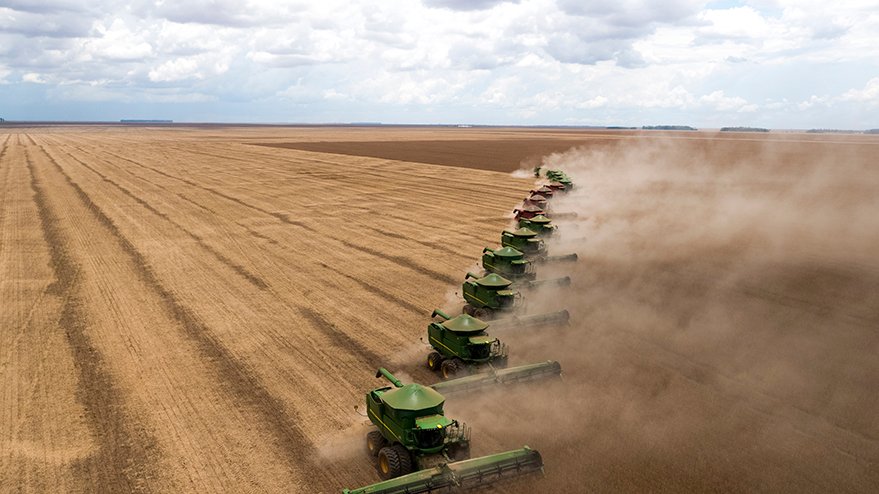Agricultural production is a source of great pride for the Brazilian economy, and in recent decades, professionalization has caused increasingly large groups to appear in the country’s crops.
When we talk about agriculture and commodity production, Brazil is also an example for the whole world. Responsible for producing a quantity of food serving 800 million people worldwide, Brazil must continue to expand its contribution to the global supply to the point that, in the next five years, it becomes the largest exporter of grains on the planet, surpassing the United States.
But, coincidentally, do you know who the real “hectare monarchs” are in Brazil? Three companies are competing for the position, and together they add nearly 1.3 million productive hectares. The dispute over the first place is fierce. Check out our production leaders.
Third place: Grupo Amaggi – 258 thousand hectares
Amaggi Agro, the agribusiness arm of Amagi GroupWe are investing in the development of Precision Agriculture (PA), which is a set of innovative technologies and methodologies aimed at improving crop management and enhancing productive areas so that we produce more, without the need for new cultivation areas.
According to the group, these technologies also regulate the use of agricultural inputs, allowing the rational use of conditioners, fertilizers and pesticides, thus gradually reducing impacts on the environment.
In Harvest 2020, More than 1 million tons of cereals and fibers were produced on approximately 258,000 hectares.
Amaggi was born in 1979, with the company Sementes Maggi, in São Miguel do Iguaçu (PR). But it didn’t take long for the Magi family to go to Mato Grosso and set up one of Brazil’s greatest farming empires. Amaggi currently owns farms in Itiquira, Sapezal, Campo Novo do Parecis, Querência and São Félix do Araguaia, all in Mato Grosso.
2º Place – SLC Agrícola – 468.2 thousand hectares
a SLC Agro, Founded in 1977 by SLC Group, is a producer of soybeans, corn and cotton. It was one of the first companies in the sector to be traded on the stock exchange in the world, and became a reference in its class. Headquartered in Porto Alegre (RS), the company has 16 production units strategically located in 6 Brazilian states for a total of 448,568 hectares in the 2019/20 crop season – 125,462 hectares of cotton, 235,444 hectares of soybeans, And 82,392 hectares of corn and 5,270 hectares of crops. Other crops.
In the 2021/2021 harvest season, the company celebrated a new record: 468.2 thousand hectares (4.4% increase compared to the previous harvest) and celebrated 78 thousand hectares with the selective application of pesticides, 8 farms with crops connected to the Internet and expanding the activities of Sementes e Integração Lavoura-Pecuária eesta Flora .
In negotiations to acquire Terra Santa, another agricultural giant, SLC expects to become the largest producer in Brazil, with a total area of 601,500 hectares, should the deal be concluded with the full acquisition of Terra Santa.
First place: Bom Futuro Group – 583 thousand hectares
“ To become the largest single producer of soybeans in the world and the largest in the cultivation of cotton in Brazil, was never a goal at Bom Futuro, but it became an outcome through effective planning, teamwork, technological support and especially harmony with nature by producing tons of grains and cotton poles in an area A total of 583 thousand hectares are cultivated in Mato Grosso ”.
This is what was announced on the show Boom Futuro Group, The largest agricultural producer in the country today and the most important of which is soybeans, with a total production of approximately 1.3 million tons per crop. Currently, Bom Futuro has 33 central production units in Mato Grosso, with 21 grain handling and storage units, 9 cotton processing units and 3 seed processing units.
The group has more than 30 years of experience in the state of Mato Grosso. Activities are distributed across the state, resulting in countless development and opportunities for hundreds of municipalities.

“Hardcore beer fanatic. Falls down a lot. Professional coffee fan. Music ninja.”






More Stories
Sabesp Receives Brazil Innovation Value Award 2024 • PortalR3
Total formal job creation reached 201.7 thousand in June, up 29.6% | Economy
10,000 Brazilian Reals are waiting for you at Nubank? Find out who can get this money!